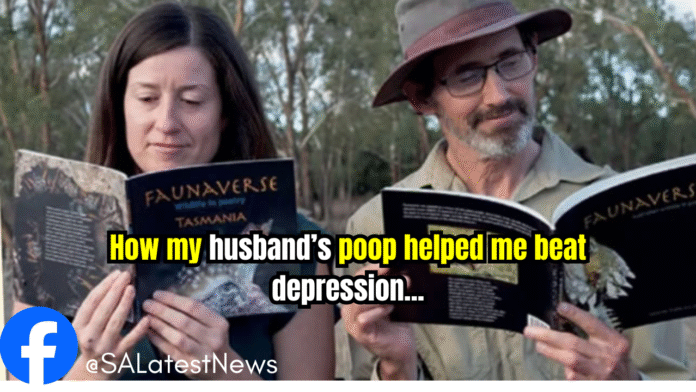Australian Couple's Unconventional Home Remedy Claims to Combat Wife's Mental Illness
Australia – In a remarkable and rather unconventional approach to tackling severe mental health issues, an Australian couple, Alex and Jane Dudley, have garnered attention for their home-based remedy aimed at treating Jane's depression and bipolar disorder. Their story, now documented in a recently published book, details how they took matters into their own hands, quite literally, to improve Jane's quality of life and their marriage.
Alex, a wildlife surveyor, game ranger, poet, and photographer, prepared a unique concoction for his wife. He mixed his faeces with a saline solution in their kitchen, strained it through a sieve, and administered it to Jane via an enema. As Alex described it, it was a matter of "head down, bum up, squeeze it in."
While the idea may seem off-putting, the couple, supported by medical experts, insist that this method has drastically improved Jane’s condition.
Faecal microbiota transplantation (FMT) as a medical treatment has historical roots, dating back to the fourth century. Typically, it involves restoring beneficial bacteria to a patient's gut to address metabolic diseases and conditions like irritable bowel syndrome. In standard medical practice, a donor’s faecal matter undergoes thorough screening for diseases and bacteria, and the procedure is conducted in clinical settings by medical professionals – precautions the Dudleys bypassed.
Alex's interest in FMT was sparked by a 2016 study that revealed researchers had transplanted faeces from depressed humans into mice, leading to the development of depression-like symptoms in the rodents. This prompted Alex to question whether the reverse could also be true – could faeces from a healthy, happy person potentially alleviate depression in someone suffering from it?
"I’d heard about the gut microbiome, the microorganisms involved in digesting and processing our food and that also transfer all sorts of good feelings to us via the gut-brain axis," Alex explained. "A lot of the precursors for dopamine and serotonin are produced in the gut. And I knew Jane’s depression was caused by not having access to dopamine and serotonin. And I was like, ‘well, maybe if we fix up the gut, it’ll allow those things to reach her brain’."
Jane admitted that she was initially "grossed out" by her husband's suggestion. However, desperate for relief from the mental health issues that had plagued her since childhood, she agreed to try it.
They administered their homemade treatment every two weeks, and after three months, Jane began to experience a noticeable difference. "I started to have self-esteem. I started to have motivation. I started to like myself. I started to feel joy. I went from being completely disabled to being a fully functional adult."
Despite the positive outcome, Jane is quick to acknowledge the recklessness of their DIY approach. "We didn’t really understand how dangerous poo transplants can be," she said. Nevertheless, for her, it proved effective, and she has since discontinued her medication for depression and bipolar disorder.
Growing up, Jane, now 42, was a bright and athletic child with aspirations of becoming a professional footballer. However, as she entered her teenage years, anxiety began to surface, and at the age of 15, she experienced sexual abuse at the hands of a relative. "It broke me on a fundamental level and was definitely the trigger for me developing serious mental illness," she recounted.
Following this traumatic event, Jane suffered from an extended bout of tonsillitis and glandular fever. These health issues, combined with her mental health struggles, led her to drop out of school in Grade 11, after which she says she "lost myself for the next 18 years". Throughout this challenging period, her parents, Glenn and Evelyn Sullivan, provided her with unwavering care and support.
At the age of 29, Jane received a diagnosis of bipolar 1 and made multiple attempts on her life. She experienced manic episodes, during which she believed she was travelling to other planets and communicating with extraterrestrial beings. "I would be talking to spirits," she recalled. "I’d feel like I had godlike powers and that I was the chosen one."
Jane described feeling trapped in a constant state of torment. "I was lost in a realm of infinite suffering and torture, with no light or hope to grasp onto. Death felt like the only escape." Her anti-psychotic medication had caused her to gain weight and had minimal impact on her mental health.
In November 2013, Jane's life took an unexpected turn when she met Alex by chance, thanks to a frog. While putting on her raincoat, Jane discovered "a very beautiful frog" sitting on her hand. She photographed the frog and sent the image to Alex, a renowned frog expert in Australia.
Alex identified the emerald-dotted frog as a common Peron’s tree frog, and the two began conversing, brought together by this simple creature. "It was bafflingly fast," said Alex, who is now in his early 60s. "Before I even laid eyes on her, I was confident Jane was the one. We just connected. It was like we’d always known each other."
Their romance blossomed, leading to marriage, and Alex became deeply involved in seeking solutions to alleviate his wife's mental health struggles. "I just totally understood the suffering she was going through. I realised exactly why she wanted to take her life and I was horrified by that."
"Here I am, an unqualified bush poet in the middle of nowhere, but I’ve always been interested in science. I’d read about the microbiome and faecal transplants. I never dreamed such a process could cure bipolar," he added.
The Dudleys' experiment was conducted with medical oversight. Jane's psychiatrist, Russell Hinton, monitored the process, and Professor Gordon Parker, a psychiatrist, subsequently studied it in consultation with other experts, including Hinton. Ultimately, the experts concluded that Alex's faeces had indeed helped to alleviate Jane's bipolar symptoms.
The outcome of their experiment is now featured in Parker's recently published book, "A Gut Mood Solution". Parker explains that the brain and gut are in constant communication through a system known as the gut-brain axis. This connection is evident in everyday experiences, such as feeling butterflies in the stomach before a meeting or experiencing an upset stomach before a big presentation. As the Dudleys discovered, this connection can also work in reverse.
"The concept of how our gut microbiome might be actually influencing our mood for the worse or for the better is the new paradigm and that has huge implications in terms of managing mood disorders," Gordon explains. "We’ve now got strongly suggestive evidence that we have an intervention that will help people with intractable mood disorders, be it depression or bipolar."
Parker's book presents five case studies in addition to Jane's. Two of the patients experienced a remission of their bipolar symptoms after undergoing FMT, while the other three initially showed a positive response, but their symptoms returned after they reduced their medication.
Jane's case has also been documented in scientific journals. "Jane is patient zero," Parker notes in his book. "We now need appropriate randomised control trials to evaluate whether FMT is an effective treatment option for the mood disorders, building on the case studies and the hypothesis that microbiome dysregulation or dysfunction and the involvement of the gut-brain axis provide the logic for the intervention."
Since undergoing her DIY FMT in 2016, Jane has continued to thrive. She has not experienced depression since March 2017 and has not had a manic episode since September 2017. She eventually completed high school and is currently in her second year of environmental science studies, with aspirations of becoming an ecologist. As she humorously puts it, "In a very real way, the number twos cured my blues."
"This is my personal story, and it's not medical advice. Always consult with a healthcare professional for any health concerns."

Follow Us on Twitter











